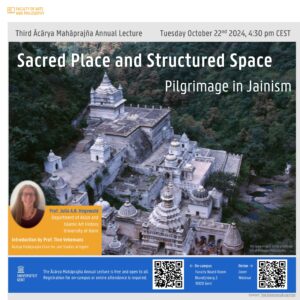This year’s Ācārya Mahāprajña Annual Lecture will be held on Thursday 22nd October, from 4:30 pm. It will take place in the Faculty Board Room (Blandijnberg 2), but will also be accessible online (see below for registration).
Our speaker Prof. Dr. Julia A.B. Hegewald (University of Bonn) will discuss aesthetic aspects of pilgrimage in Jainism.

Sacred Place and Structured Space: Pilgrimage in Jainism
This presentation explores reasons why Jainas go on pilgrimage. The audience is introduced to different concepts, which make pilgrimage places sacred. Amongst these sacred places are sites of historical importance, usually linked to the life of one of the Jinas, to a miraculous event, a striking natural feature or an especially powerful icon. Such pilgrimage sites attract generous donations and grow substantially over the years. The importance of specific sites is also reflected and can be further enhanced by representing them in paintings, prints and miniature models. Such reproductions make the sites available at other places as well and widen their area of influence. As Jainas aim to go on pilgrimage during particularly auspicious periods, pilgrimage is also tightly linked to Jaina festivals.
Speaker
Julia A.B. Hegewald has been Professor of Oriental Art History and Head of the Department of Asian and Islamic Art History, at the University of Bonn, since 2010. She was Reader in Art History at Manchester University, a postdoctoral Fellow at the South Asia Institute of Heidelberg University and a Research Fellow at University College Oxford. She studied at the School of Oriental and African Studies (SOAS), London, from where she also holds a PhD. Her books on Jainism include: Jaina Temple Architecture in India: The Development of a Distinct Language in Space and Ritual (2009; 2018; 2024), The Jaina Heritage: Distinction, Decline and Resilience (2010), Jaina Painting and Manuscript Culture: In Memory of Paolo Pianarosa (2015), and Jaina Tradition of the Deccan: Shravanabelagola, Mudabidri, Karkala (2021).
Registration
Register for on-campus attendance: https://forms.gle/dDBN8EeVSWjYJ7tj6
Register for online attendance: https://us06web.zoom.us/webinar/register/WN_ChbEIKvpQ6-X9tNwJbE5Cg
This event will be followed by a small reception.
